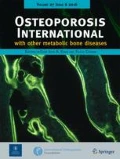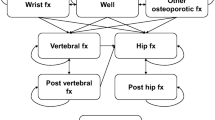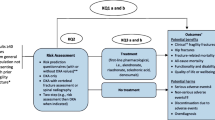Abstract
Summary
SCOOP is a UK seven-centre, pragmatic, randomised controlled trial with 5-year follow-up, including 11,580 women aged 70 to 85 years, to assess the effectiveness and cost-effectiveness of a community-based screening programme to reduce fractures. It utilises the FRAX algorithm and DXA to assess the 10-year probability of fracture.
Introduction
Osteoporotic, or low-trauma, fractures present a considerable burden to the National Health Service and have major adverse effects on quality of life, disability and mortality for the individual.
Methods
Given the availability of efficacious treatments and a risk assessment tool based upon clinical risk factors and bone mineral density, a case exists to undertake a community-based controlled evaluation of screening for subjects at high risk of fracture, under the hypothesis that such a screening programme would reduce fractures in this population.
Results
This study is a UK seven-centre, unblinded, pragmatic, randomised controlled trial with a 5-year follow-up period. A total of 11,580 women, aged 70 to 85 years and not on prescribed bone protective therapy will be consented to the trial by post via primary care providing 90% power to detect an 18% decrease in fractures.
Conclusions
Participants will be randomised to either a screening arm or control. Those undergoing screening will have a 10-year fracture probability computed from baseline risk factors together with bone mineral density measured by DXA in selected subjects. Individuals above an age-dependent threshold of fracture probability will be recommended for treatment for the duration of the trial. Subjects in the control arm will receive ‘usual care’. Participants will be followed up 6 months after randomisation and annually by postal questionnaires with independent checking of hospital and primary care records. The primary outcome will be the proportion of individuals sustaining fractures in each group. An economic analysis will be carried out to assess cost-effectiveness of screening. A qualitative evaluation will be conducted to examine the acceptability of the process to participants.
Similar content being viewed by others
References
Osteoporosis Prevention, Diagnosis, and Therapy. NIH Consensus Statement 2000 March 27–29;17: 1–45
Kanis JA, Glüer CC (2000) An update on the diagnosis and assessment of osteoporosis with densitometry. Osteoporos Int 11:192–202
World Health Organisation (1994) Assessment of fracture risk and its application to screening for postmenopausal osteoporosis. WHO Technical Report Series, Geneva
Johnell O, Kanis JA (2006) An estimate of the worldwide prevalence and disability associated with osteoporotic fractures. Osteoporos Int 17(12):1726–1733
Chrischilles EA, Butler CD, Davis CS, Wallace RB (1991) A model of lifetime osteoporosis impact. Arch Intern Med 151:2026–2032
Royal College of Physicians (1999) Clinical guidelines for the prevention and treatment of osteoporosis. RCP, London
Eddy DM, Johnston CC Jr, Cummings SR et al (1998) Osteoporosis: review of the evidence for prevention, diagnosis, and treatment and cost-effectiveness analysis. Status report. Osteoporos Int 8(S4):S1–S82
Cummings SR, Melton LJ III, Osteoporosis I (2002) Epidemiology and outcomes of osteoporotic fractures. Lancet 359:1761–1767
Torgerson DJ, Iglesias CP, Reid D (2001) The economics of fracture prevention. In: Barlow DH, Francis RM, Miles A (eds) The effective management of osteoporosis. Aesculapius Medical Press, London
Chapuy MC, Arlot ME, Duboeuf F et al (1992) Vitamin D3 and calcium to prevent hip fractures in elderly women. N Engl J Med 327:1637–1642
Dawson-Hughes B, Harris SS, Krall EA et al (1997) Effect of calcium and vitamin D supplementation on bone density in men and women 65 years of age or older. N Engl J Med 337:670–676
Roux C, Reginster J-Y, Fechtenbaum J, Kolta S, Sawicki A, Tulassay Z, Luisetto G, Padrino J-M, Doyle D, Prince R, Fardellone P, Sorensen OH, Meunier PJ (2006) Vertebral fracture risk reduction with strontium ranelate in women with postmenopausal osteoporosis is independent of baseline risk factors. J Bone Miner Res 21:536–542
Writing Group for the Women’s Health Initiative (2002) Risks and benefits of estrogen plus progestin in healthy postmenopausal women. Principal results from the Women’s Health Initiative RCT. JAMA 288:321–333
McClung M, Geusens P, Miller P et al (2001) Effect of risedronate on the risk of hip fracture in elderly women. N Engl J Med 344:333–340
Hodsman AB, Hanley DA, Josse R (2002) Do bisphosphonates reduce the risk of osteoporotic fractures? An evaluation of the evidence to date. CMAJ 166:1426–1430
Kanis JA, Brazier JE, Stevenson M, Calvert NW, Jones LM (2002) Treatment of established osteoporosis: a systematic review and cost-utility analysis. Health Technol Assess 6(29):1–146
Marshall D, Johnell O, Wedel H (1996) Meta-analysis of how well measures of bone mineral density predict occurrence of osteoporotic fractures. BMJ 312:1254–1259
Schuit SCE, van der Klift M, Weel AEA et al (2004) Fracture incidence and association with bone mineral density in elderly men and women: the Rotterdam Study. Bone 34:195–202
Wainwright SA, Marshall LM, Ensrud KE et al (2005) Hip fracture in women without osteoporosis. J Clin Endocrinol Metab 90:2787–2793
Kanis JA, Borgstrom F, De Laet C et al (2005) Assessment of fracture risk. Osteoporos Int 16(6):581–589
Kanis JA, Oden A, Johnell O et al (2007) The use of clinical risk factors enhances the performance of BMD in the prediction of hip and osteoporotic fractures in men and women. Osteoporos Int 18:1033–1046
McGrother CW, Donaldson MMK, Clayton D, Abrams KR, Clarke M (2002) Evaluation of a hip fracture risk score for assessing elderly women: the Melton osteoporotic fracture study. Osteoporos Int 13:89–96
Black DM, Steinbuch M, Palermo L et al (2001) An assessment tool for predicting fracture risk in postmenopausal women. Osteoporos Int 12:519–528
van Staa TP, Leufkens HGM, Cooper C (2002) Utility of medical and drug history in fracture risk prediction among men and women. Bone 31:508–514
Oden A, Dawson A, Dere W et al (1998) Lifetime risk of hip fracture is underestimated. Osteoporos Int 8:599–603
Johansson H, Oden A, Johnell O et al (2004) Optimisation of BMD measurements to identify high risk groups for treatment—a test analysis. J Bone Miner Res 19:906–913
Kanis JA, Johnell O, Oden A et al (2000) Risk of hip fracture according to the World Health Organization criteria for osteopenia and osteoporosis. Bone 27:585–590
Kanis JA, Johnell O, Oden A, Johansson H, McCloskey E (2008) FRAX and the assessment of fracture probability in men and women from the UK. Osteoporos Int 19:385–397
Kanis JA, Johnell O, Black DM, Downs RW Jr, Sarkar S, Fuerst T, Secrest RJ, Pavo I (2003) Effect of raloxifene on the risk of new vertebral fracture in postmenopausal women with osteopenia or osteoporosis: a reanalysis of the Multiple Outcomes of Raloxifene Evaluation trial. Bone 33:293–300
Kanis JA, Barton IP, Johnell O (2005) Risedronate decreases fracture risk in patients selected solely on the basis of prior vertebral fracture. Osteoporos Int 16(5):475–482
Quandt SA, Thompson DE, Schneider DL, Nevitt MC, Black DM (2005) Effect of alendronate on vertebral fracture risk in women with bone mineral density T scores of −1.6 to −2.5 at the femoral neck: the Fracture Intervention Trial. Mayo Clin Proc 80(3):343–349
McCloskey E, Selby P, Davies M et al (2004) Clodronate reduces vertebral fracture risk in women with postmenopausal or secondary osteoporosis: results of a double-blind, placebo-controlled 3-year study. J Bone Miner Res 19(5):728–736
McCloskey EV, Johansson H, Oden A, Vasireddy S, Kayan K, Pande K, Jalava T, Kanis JA (2009) Ten-year fracture probability identifies women who will benefit from clodronate therapy—additional results from a double blind, placebo controlled randomised study. Osteoporos Int 20:811–818
Kanis JA, Johansson H, Oden A, McCloskey EV (2009) Bazedoxifene reduces vertebral and clinical fractures in postmenopausal women at high risk assessed with FRAX®. Bone 44:49–54
Compston J, Cooper A, Cooper C, Francis R, Kanis JA, Marsh D, McCloskey EV, Reid DM, Selby P, Wilkins M (2009) On behalf of the National Osteoporosis Guideline Group (NOGG) Guidelines for the diagnosis and management of osteoporosis in postmenopausal women and men from the age of 50 years in the UK. Maturitas 62:105–108
Wilson JMG, Jungner G (1968) Principles and practices of screening for disease. World Health Organisation, Geneva
La Croix AZ, Buist DSM, Brenneman SK et al (2002) Evaluation of three population-based strategies for fracture prevention: results of the OPRA trial. J Bone Miner Res 17:260
Torgerson DJ, Donaldson C, Russell IT et al (1995) Hormone replacement therapy: compliance and cost after screening for osteoporosis. Eur J Obstet Gynaecol 59:57–60
Barr RJ, Stewart A, Torgerson DJ et al (2005) Screening elderly women for risk of future fractures—participation rates and impact on incidence of falls and fractures. Calcif Tissue Int 76:243–248
Kanis JA, Borgstrom F, Zethraeus N et al (2005) Intervention thresholds for osteoporosis in the UK. Bone 36:22–32
Lakatos E, Lan K (1992) A comparison of sample size methods for the logrank statistic. Stat Med 11:179–191
van Staa TP, Dennison EM, Leufkens HGM et al (2001) Epidemiology of fractures in England and Wales. Bone 29:517–522
Torgerson DJ (2001) Contamination in trials: is cluster randomization the answer? BMJ 322:355–357
Conflicts of interest
None.
Author information
Authors and Affiliations
Corresponding author
Rights and permissions
About this article
Cite this article
Shepstone, L., Fordham, R., Lenaghan, E. et al. A pragmatic randomised controlled trial of the effectiveness and cost-effectiveness of screening older women for the prevention of fractures: rationale, design and methods for the SCOOP study. Osteoporos Int 23, 2507–2515 (2012). https://doi.org/10.1007/s00198-011-1876-7
Received:
Accepted:
Published:
Issue Date:
DOI: https://doi.org/10.1007/s00198-011-1876-7




